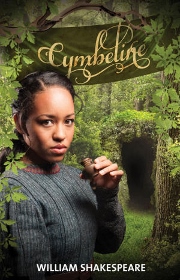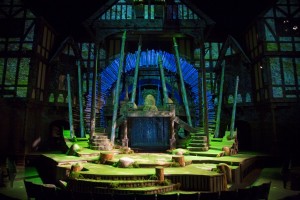NO PROBLEM WITH THIS “PROBLEM PLAY”
In Oregon Shakespeare Festival’s performance of Shakespeare’s Cymbeline, director Bill Rauch manages to brew a potion of familiar Shakespearean themes including switched identities, jealousy and innocence wronged, while adding a lighthearted dollop of a lovely princess, an evil queen, and a misguided king. What results is a 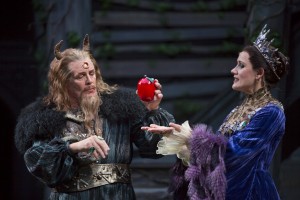 sparkling showstopper. Rauch confidently distills this most labyrinthine and fantastical of plays to its effervescent conclusion. Along the way, the audience gets a satisfying tale of life, and love, renewed.
sparkling showstopper. Rauch confidently distills this most labyrinthine and fantastical of plays to its effervescent conclusion. Along the way, the audience gets a satisfying tale of life, and love, renewed.
Performed in the splendid open air Elizabethan Theatre, Michael Ganio’s clever multi-tier set functions simultaneously as ancient castle and Boreal forest. The rustic outdoor venue heightens the play’s themes of connection with nature, only enhanced by night breezes and real life bats flying in and out of the stage lights.
This production showcases some fabulous actors who are great at playing evil. Al Espinosa, as Clotin, son of the Queen, makes the most of his plumb role; narcissistic, cowardly and utterly convincing, Espinosa plays a scheming rejected suitor for huge laughs. Excellent as well is Kenajuan Bentley as Iachimo, the trickster, who bets against Princess Imogen’s chastity and delivers a golden performance with his sonorous voice and knack for physical comedy. Robin 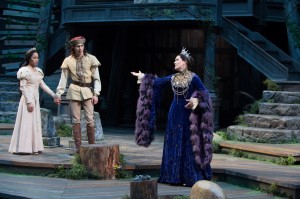 Goodrin Nordli shines as the wicked Queen; part Lady Macbeth, part Snow White’s evil stepmother proffering the poisoned apple, she’s killer.
Goodrin Nordli shines as the wicked Queen; part Lady Macbeth, part Snow White’s evil stepmother proffering the poisoned apple, she’s killer.
Captivating, too, are the rustic princes, Donovan Mitchell (Arviragus) and Raffi Barsoumian (Guiderius); athletic, charming and sympathetic, these boys are just chock full of charisma. Jeffrey King as Belarius is moving as their woodsman father-figure. Daniel Jose Molina (Posthumus) and Dawn-Lyen Gardner (Imogen) play their roles with competent realism.
Lovely in face and figure, Gardner perhaps didn’t carry her part as well as she might have. Given her slightness, she may not have been the right physical type to carry off this transgendered role, but she could have played up the incongruity more. Aside from donning a feathered hat, there was no real attempt to show her transformation from coquette to hunter/soldier – a missed opportunity, as it would 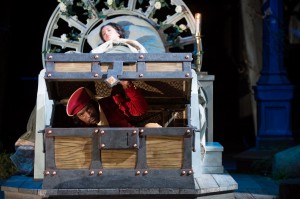 have been a fun to see her struggle more with becoming a boy, if only to highlight one of the play’s major themes: how concealment and disguise lead to transformation.
have been a fun to see her struggle more with becoming a boy, if only to highlight one of the play’s major themes: how concealment and disguise lead to transformation.
Yet overall the ensemble cast was excellent; highly dynamic, they exuded an infectious enthusiasm for playing this mash-up of roles. Comedy ruled the night, and all I will say is that the beheading scene was hilarious. Much was due to expert stage direction, which turned horrifying spectacle into priceless and winning merriment.
As a dark comedy or “problem play,” Cymbeline is true motley, shuffling humor, fairy tale motifs and murderous betrayal with an underlying spiritual message. Intoxicating, but never unsteady, this production embraces the challenge of its 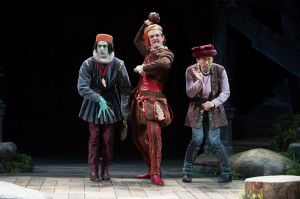 pastiche identity, showcasing confident, modern directorial choices which juxtapose the contemporary with the antique. Rauch employs the interesting filmic effect, for example, of having characters freeze in place at key moments while background material is narrated. Later, high-tech computerized projections of waves are employed to suggest the oceans traveled as a scene moves to Italy, while gray-scale videos of wind-tossed branches and moors propel us back to the rustic princes in the Welsh forest (Lighting Designer, David Weiner; Projection & Video Designer, Alexander V. Nichols; Choreographer, Jessica Wallenfels).
pastiche identity, showcasing confident, modern directorial choices which juxtapose the contemporary with the antique. Rauch employs the interesting filmic effect, for example, of having characters freeze in place at key moments while background material is narrated. Later, high-tech computerized projections of waves are employed to suggest the oceans traveled as a scene moves to Italy, while gray-scale videos of wind-tossed branches and moors propel us back to the rustic princes in the Welsh forest (Lighting Designer, David Weiner; Projection & Video Designer, Alexander V. Nichols; Choreographer, Jessica Wallenfels).
Anachronism plays out in David C. Woolard’s costumes as well: The characters of this supposedly ancient Celtic royal court are clad in the Renaissance robes; 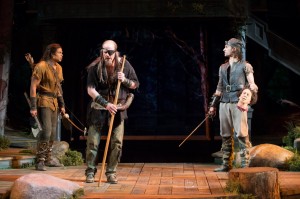 alongside them walk Roman soldiers, not to mention elfin characters with long ears straight out of the special effects department of a Tolkien movie. Some costumes are strongly elaborate and fanciful, such as that donned by the character of Cornelius (played charmingly by Anthony Heald) wearing horns and a third eye. Such costuming cleverly facilitates in bringing Shakespeare to modern audiences who are comfortable with the visual vocabulary of computers and film. Rauch appeals to the proclivities of his mass audience, just as Shakespeare did in his day.
alongside them walk Roman soldiers, not to mention elfin characters with long ears straight out of the special effects department of a Tolkien movie. Some costumes are strongly elaborate and fanciful, such as that donned by the character of Cornelius (played charmingly by Anthony Heald) wearing horns and a third eye. Such costuming cleverly facilitates in bringing Shakespeare to modern audiences who are comfortable with the visual vocabulary of computers and film. Rauch appeals to the proclivities of his mass audience, just as Shakespeare did in his day.
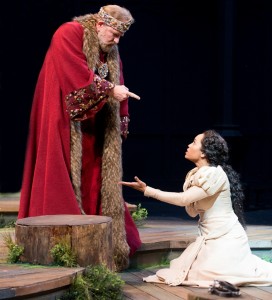 Which brings us to the choice of casting deaf actor Howie Seago as King Cymbeline. An interpreter gives voice to his lines, and other characters employ sign language to communicate with him. While at first a distraction, the ballet-like fluidity of the signing eventually added a patina of stylization that fit well with the show’s fairy-tale motif. Moreover, it is emblematic of how Rauch makes interesting, anachronistic choices that serve the Shakespearean context. While signing screams modern, its history, in fact, goes back to at least to the 1500s (its “invention” continues to be debated, as some argue that early man, before spoken language, used gesture). Sign language is thus at once contemporary, historical and pre-historical – a perfect trope for Cymbeline. There’s no explanation given here for the King’s deafness, but this added element did serve to make the King a better-rounded character, and supplied some justification for his not noticing the Queen’s bad behavior.
Which brings us to the choice of casting deaf actor Howie Seago as King Cymbeline. An interpreter gives voice to his lines, and other characters employ sign language to communicate with him. While at first a distraction, the ballet-like fluidity of the signing eventually added a patina of stylization that fit well with the show’s fairy-tale motif. Moreover, it is emblematic of how Rauch makes interesting, anachronistic choices that serve the Shakespearean context. While signing screams modern, its history, in fact, goes back to at least to the 1500s (its “invention” continues to be debated, as some argue that early man, before spoken language, used gesture). Sign language is thus at once contemporary, historical and pre-historical – a perfect trope for Cymbeline. There’s no explanation given here for the King’s deafness, but this added element did serve to make the King a better-rounded character, and supplied some justification for his not noticing the Queen’s bad behavior.
Coming together with real human pathos by the end, OSF’s performance of Cymbeline is a rare and unique opportunity to see this relatively unknown Shakespeare play done delightfully. The play’s final, simple message of compassion and forgiveness could prove the elixir for today’s travails.
photos by T. Charles Erickson and Jenny Graham
Cymbeline
Oregon Shakespeare Festival
scheduled to end on October 11, 2013
for tickets, call 800.219.8161 or visit http://www.osfashland.com
